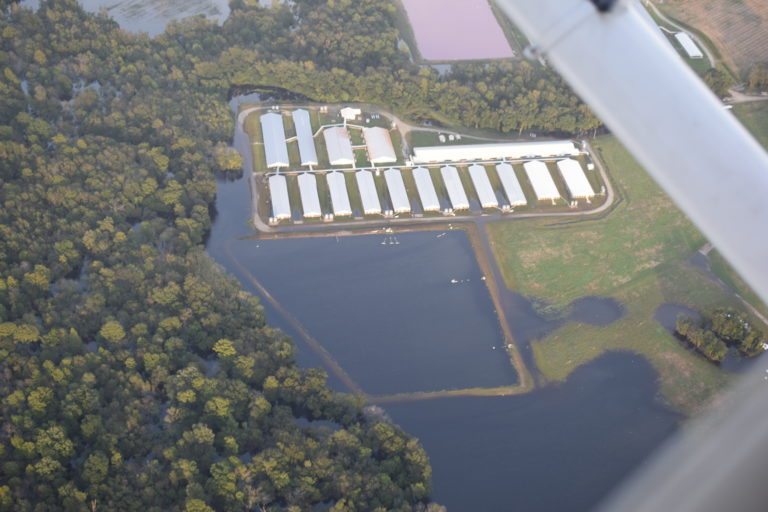
One big lesson of Hurricane Florence: North Carolina has failed to learn from the recent past.
As part of my job as an environmental lawyer at Waterkeeper Alliance, I look at a lot of post-hurricane photos of flooded cesspools the size of Olympic swimming pools at industrial swine operations. When I do, I always look for a date, because history keeps repeating itself.
We’ve got photos going back more than 20 years. And the same ugly, preventable disasters happened again just last month because we ignored the warnings of experts we assembled decades ago to devise a better way.
In 1995, a lagoon at a swine facility in Jacksonville burst, spilling 28.5 million gallons of hog waste into a tributary of the New River. In the aftermath, the North Carolina General Assembly created a Blue Ribbon Study Commission to recommend ways to protect the state’s groundwater, drinking water, and air quality from the massive quantities of animal waste generated by industrial meat operations.
While critics expected an industry-friendly report, the reforms it proposed were real, including recommendations to better protect neighbors from outmoded waste management practices. Most notably, the commission recommended prompt transition away from the “lagoon and sprayfield system,” in which thousands of gallons of animal waste is kept in open cesspools, then sprayed on adjacent cropland.
This was a moment of opportunity. The legislature was friendly. The blueprint was there for the swine industry to clean up its act. Instead, Smithfield Foods, the state’s top pork producer, dragged its feet, made generous donations to state legislators, and changed the topic. The transition away from open cesspools of waste on swine farms never happened.
We missed another opportunity in 1999 when Hurricane Floyd exposed the foolishness of storing tremendous volumes of waste in flood-prone areas. The storm flooded at least 45 swine lagoons and the state was ready for change.
The state budgeted money to buy out operations in the 100-year floodplain, but it wasn’t much. In the end, the state bought out only 42 industrial animal operations after Floyd. It was a slight improvement; 35 of the operations bought out after Floyd would have flooded in Hurricane Matthew. (The state’s buyout plan following Hurricane Matthew was even more anemic — and slow. Funded with leftovers from the Matthew relief package, it has only enough money to buy out about three operations. The legislature just this month solicited applications for Matthew-related swine operation buyouts.)
Meanwhile, some of the most dangerous waste management practices on swine operations are essentially unchanged. The way they do business continues to threaten our communities and environment.
As the talk during the next legislative session in North Carolina inevitably turns to buying out industrial animal operations in the floodplain, it’s worth remembering how much work remains to be done.
There are now 123 industrial hog operations and 40 industrial poultry operations within 500 feet of the 100-yr floodplain. Those 163 sites are capable of producing more than 395 million gallons of liquid waste from hogs and more than 27,000 tons of dry waste from poultry each year.
What we haven’t done — what we keep missing the opportunity to do — is compel swine and poultry operations to store and manage waste in a way that protects the air, the water — and North Carolinians. The cost of missing that opportunity is significant. It rises when increasingly frequent and severe storms spill more waste into our waterways. But it also rises under sunny skies.
A recent study published in North Carolina Medical Journal found that residents living near North Carolina’s industrial animal operations had higher rates of all-cause mortality, infant mortality, mortality from anemia, kidney disease, tuberculosis, and septicemia, and higher rates of emergency room visits than the residents in the control group.
If we’re going to fix the problems with industrial animal agriculture in our state, we need to stop being willfully blind to these human costs.
It’s time to demand our leaders stop ignoring the ever-present danger in our coastal plain. It’s time to really learn the lessons we should have learned from our past. These are disasters we can prevent, problems we can fix. It’s time we did.